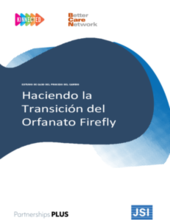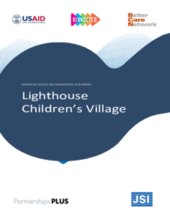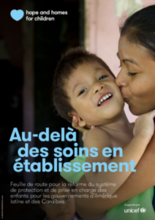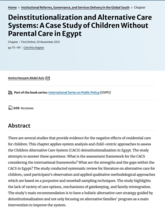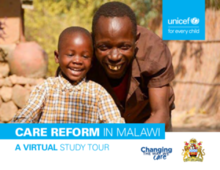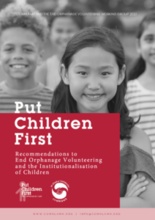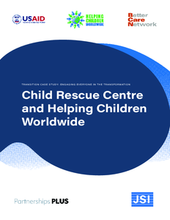Displaying 101 - 110 of 691
Este estudio de caso destaca algunas de las dinámicas clave que surgieron a lo largo del proceso de transición de sus servicios de la atención residencial a la programación no institucional de una organización y examina cómo esas dinámicas influyeron en la transición y determinaron el tipo de apoyo brindado, así como el más apropiado. estrategia de transición. El estudio de caso se organiza en torno a las distintas etapas de la transición y explora algunos de los temas clave descritos en la Herramienta de evaluación de modelos de atención en transición.
Más Allá del Cuidado Institucional proporciona un marco para que los gobiernos desarrollen su propia hoja de ruta para la reforma de sus sistemas de protección y cuidado infantil y la desinstitucionalización. Esperamos que esto inspire el diálogo, guíe las conversaciones entre grupos interministeriales y en la sociedad, oriente a grupos
multidisciplinarios de todos los niveles en la creación de su propia evaluación y ayude en la planificación de su propia hoja de ruta para el cambio.
La Aldea Infantil Lighthouse se estableció en 2004 como una institución de atención residencial de gestión privada y financiada con fondos privados. En 2014, su donante principal desde hace mucho tiempo tomó la decisión de eliminar gradualmente la atención institucional de apoyo financiero. Este estudio de caso destaca algunas de las señales de advertencia tempranas y el posterior descubrimiento de comportamientos no éticos y delictivos que a veces se pueden observar en un proceso de transición.
Au-delà des soins institutionnels fournit un cadre aux gouvernements pour développer leur propre feuille de route pour la réforme et la désinstitutionnalisation du système de protection et de garde des enfants. Nous espérons qu'il inspirera une conversation, guidera le dialogue interministériel et interprofessionnel, soutiendra les groupes multidisciplinaires à tous les niveaux pour encadrer leur propre évaluation et planifier leur propre feuille de route pour le changement.
There are several studies that provide evidence for the negative effects of residential care for children. This chapter applies system analysis and child-centric approaches to assess the Children Alternative Care System (CACS) deinstitutionalization in Egypt.
This virtual study tour aims to provide you with an overview of care reform in Malawi from the comfort of your own home. Care reform relates to the care of children. It refers to efforts to improve the legal and policy frameworks, structures, services, supports and resources that determine and deliver alternative care, prevent family separation and support families to care for children well.
Research has shown the harm of orphanage care on children’s health, development and wellbeing and how orphanage volunteering is working to perpetuate these institutional systems which separate children from their families and communities. There is now a global movement to end both practices. These key policy recommendations were published as part of the "Put Children First: End Orphanage Care" campaign.
The current article investigated the financial impact of transitioning to a family-based model of care, donor engagement practices used in this process, and changes in donor support resulting from the transition.
The Child Rescue Centre was the first orphanage in Sierra Leone to successfully complete a transition from residential to family-based care. This case study highlights some of the key dynamics that arose throughout the transition of the orphanage and examines how those dynamics both influenced the transition and determined the type of support provided as well as the most appropriate transition strategy.

